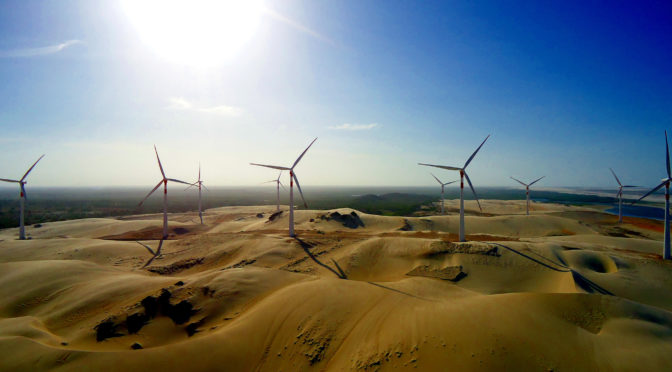Wind energy in Brazil, with 33 GW of installed capacity, will play a key role in the decarbonization of the economy and the production of green hydrogen, according to ABEEólica.
Wind energy, which went unnoticed 15 years ago and is now the second largest source of electricity in Brazil, will be “decisive” in the country’s energy transition, says the president of the Brazilian Wind Energy Association (ABEEólica), Elbia Gannoum, in an interview with EFE.
“We will be decisive in this transition because, in addition to already being essential in the electrical matrix, the process of decarbonization of the economy will also make us decisive in the energy matrix, including fuels,” says the head of ABEEólica, who will participate in the II Latin American Green Economy Forum that the EFE Agency is organizing in São Paulo next Tuesday and Wednesday.
According to Gannoum, the Brazilian economy will undergo a strong reform to decarbonize and wind energy will become essential not only to generate electricity, but also to supply industry and transport, contributing to the generation of green hydrogen or other zero-carbon fuels and products.
Currently, in Brazil there are about 1,100 parks operated by 60 companies and producing 33 gigawatts (GW), with wind power accounting for 16% of all electricity generated in the country.
“Fifteen years ago Brazil was the fifteenth economy in the world in installed capacity, with one GW, and today, with 33 GW, we are the sixth country in installed capacity and the third that invests the most in wind energy in the world,” said Gannoum, who is also vice president of the board of the Global Wind Energy Council (GWEC).
According to Gannoum, in the last four years Brazil has gained about 4 gigawatts of wind energy per year and that number will increase significantly in the coming years due to the demand generated by green hydrogen producers and other decarbonization projects.
ABEEólica’s projections, he said, do not include what Brazil will be able to produce with offshore wind power because its implementation still depends on the approval of a legal framework.
Even before having that legal framework, around twenty companies have already requested the environmental license to launch 97 offshore wind energy projects in Brazil with a combined capacity to generate 234.2 gigawatts, greater than the country’s current capacity (206 GW).
According to Gannoum, the “big concern” for Brazil is how to generate demand for that energy.
“To do this, we need a leap in economic growth and to start producing more goods and services that use energy. We have to produce green goods, green raw materials, that have added value and that are in demand by countries like the European ones that are looking to decarbonize their economies,” he said.
Among these goods, he mentioned green steel products and green fuels, such as low-carbon hydrogen.
He also mentioned the negotiations that Brazilian wind power companies are holding with technology companies to offer renewable energy to large data centers for artificial intelligence, which demand a lot of electricity.
ABEEólica will be one of the protagonists of the II Latin American Green Economy Forum, organized by the EFE Agency and which will bring together authorities, experts and representatives of the public and private sectors to discuss the challenges posed by the climate crisis and the energy transition.
The meeting, which will take place on Tuesday and Wednesday in São Paulo, is sponsored by ApexBrasil and Norte Energía and has the support of Vivo and the Spanish Chamber in Brazil.

